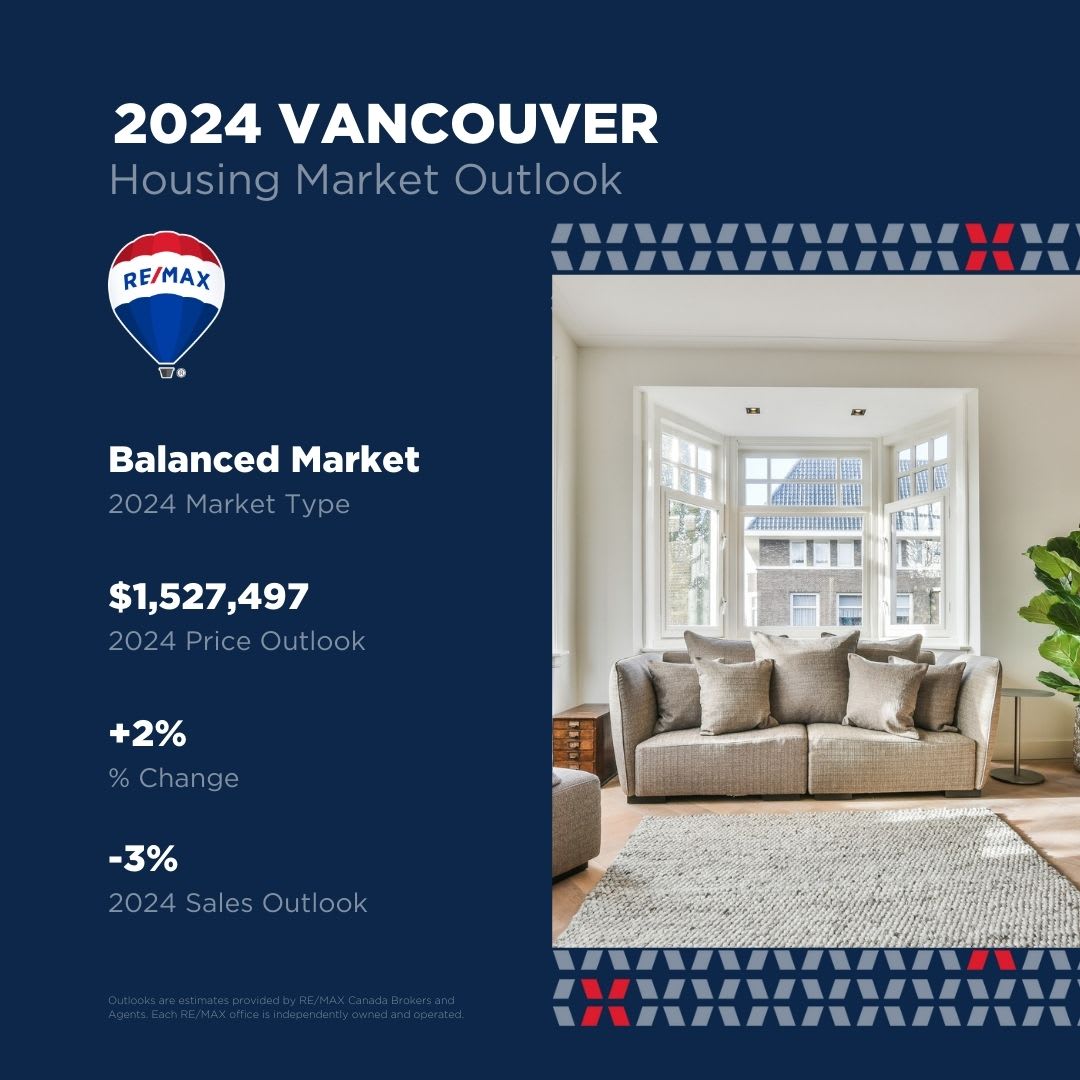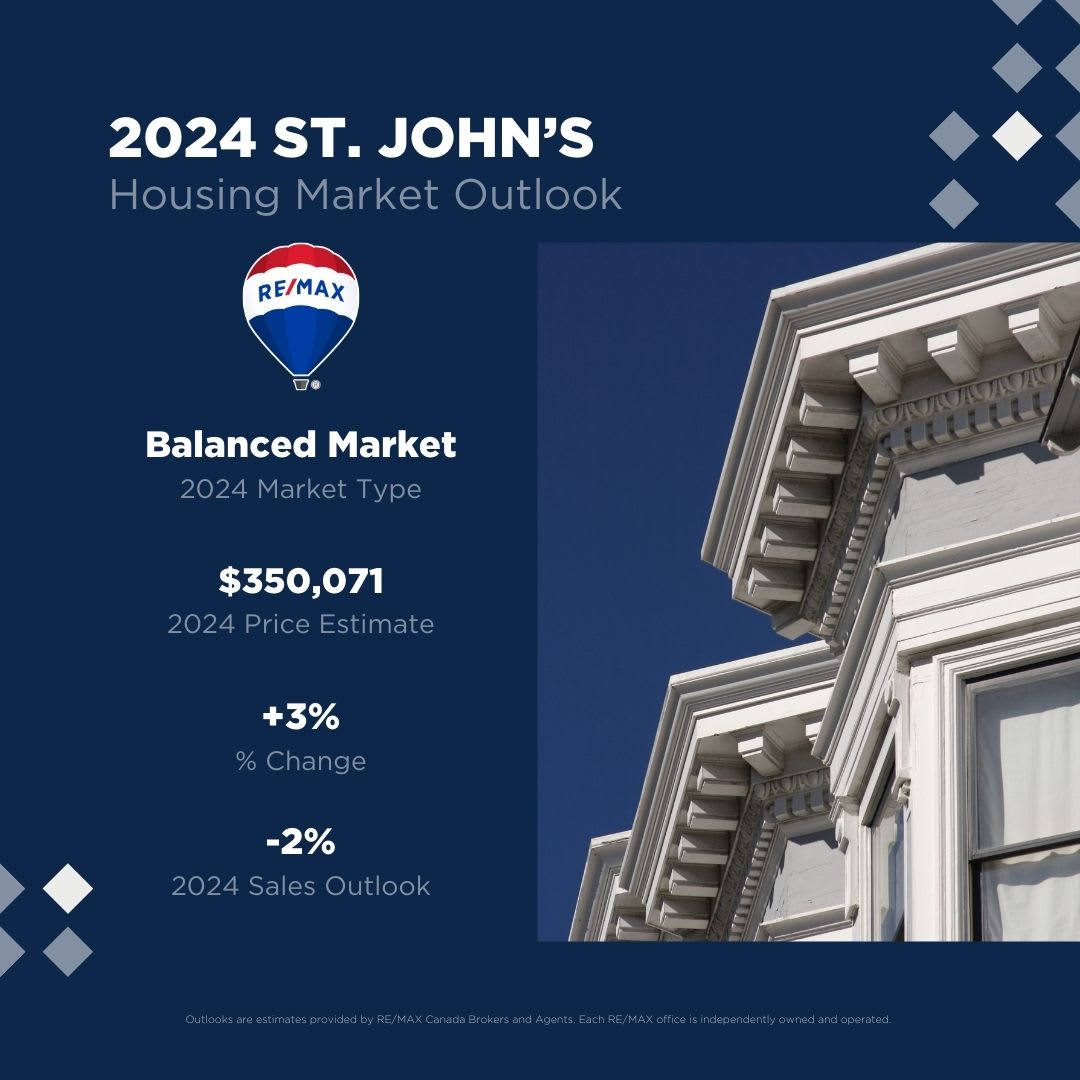RE/MAX continues to be the authoritative voice in Canada when it comes to all things real estate. Amassing over 2.14 billion media impressions in 2023 and 13,000+ news stories published, we are proud to be the voice of real estate in Canada.
Behind every RE/MAX Report there’s an asset designed for you to share.
Over the past few years, RE/MAX has shifted its focus to adapt a broader range of topics for which our network can speak to and provide value. From taxation to liveability to hot pocket communities and our annual housing market outlook reports – there’s sure to be something you can leverage throughout the year to share insights and knowledge with your clients and sphere of influence.
Explore the 2024 RE/MAX Reports
(this list will continue to be updated as new reports are released)
The Greater Toronto Area’s (GTA) luxury housing market shifted into high gear in the final quarter of 2024, with sales over $3 million climbing more than 40 per cent ahead of year-ago levels for the same period. Just over 360 freehold and condominium properties sold in Q4 2024, up from the 259 sales reported in Q4 2023, according to the latest RE/MAX Canada report.
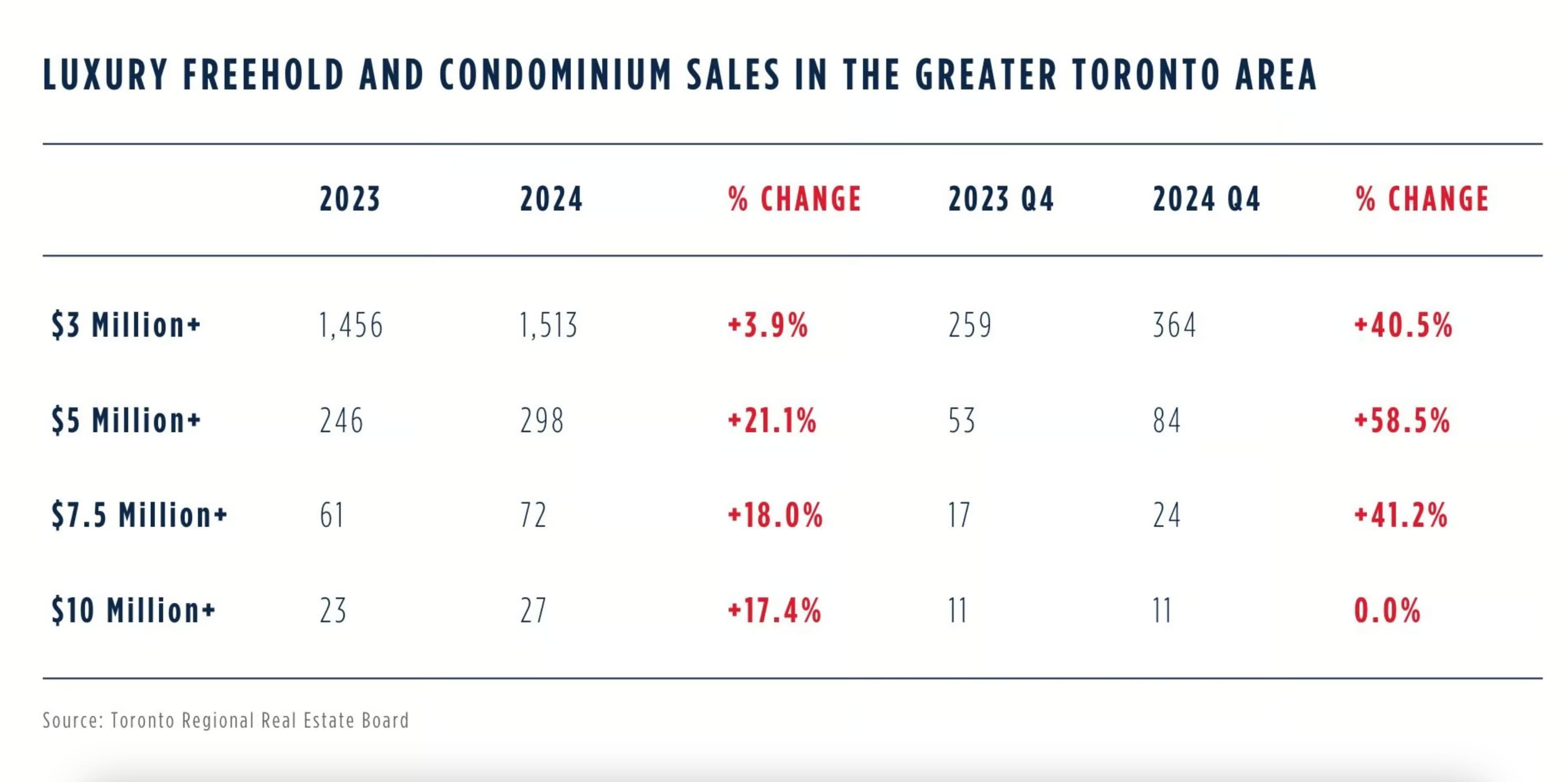
Report Highlights
- Sales in Toronto’s luxury home market recorded double-digit growth in Q4 2024.
- There was a strong finish to the year, with sales luxury homes priced $3M+ up over 40% in Q4.
- Sales $5M+ led the charge in Q4, up 58.5% year-over-year.
- Sales in Q4 represented one-quarter of total luxury activity, up from 17.7% at the same time last year.
- Rosedale and Forest Hill South proved most popular, especially in the final quarter with 13 sales $5M+ in Rosedale and 7 in Forest Hill.
- In 2025, the momentum is expected to continue to increase, as more buyers move into the market.

Canadians are looking ahead to 2025 with a positive outlook on the housing market, prompted by a series of interest rate cuts in the latter part of 2024. RE/MAX Canada and its network of brokers and agents are expecting a more active market next year, with the national average residential price likely to increase by five per cent, and sales anticipated to rise in 33 out of 37 regions surveyed, with sales increases of up to 25 per cent.
National Market Trends
- National average price expected to rise 5% in 2025: Average price growth in RE/MAX regions surveyed to range from 0.1%-10%.
- Seller’s markets likely to dominate in 2025: 44% of regions will favour sellers, 33% will balance out, and 17% will favour buyers.
- Consumer optimism is on the rise enterting 2025: 36% of Canadians are optimistic that the housing market will improve in 2025.
Canadian Consumer Trends
We surveyed Canadians on their perceptions of the 2024 housing market, and their expectations for 2025. Explore all the consumer trends in the report on remax.ca.



Regional Market Trends
The majority of the regions surveyed noted that first time homebuyers are one audience group driving the market across the nation, and many are looking for townhomes and small residential properties such as bungalows, while move-up and move-over homebuyers are looking for larger properties with additional space. On the flip side, retirees are seeking to down-size in most regions, with the exception of Calgary who are seeking villas and larger condominiums. Explore more regional insights from RE/MAX brokers across the country in the report on remax.ca.



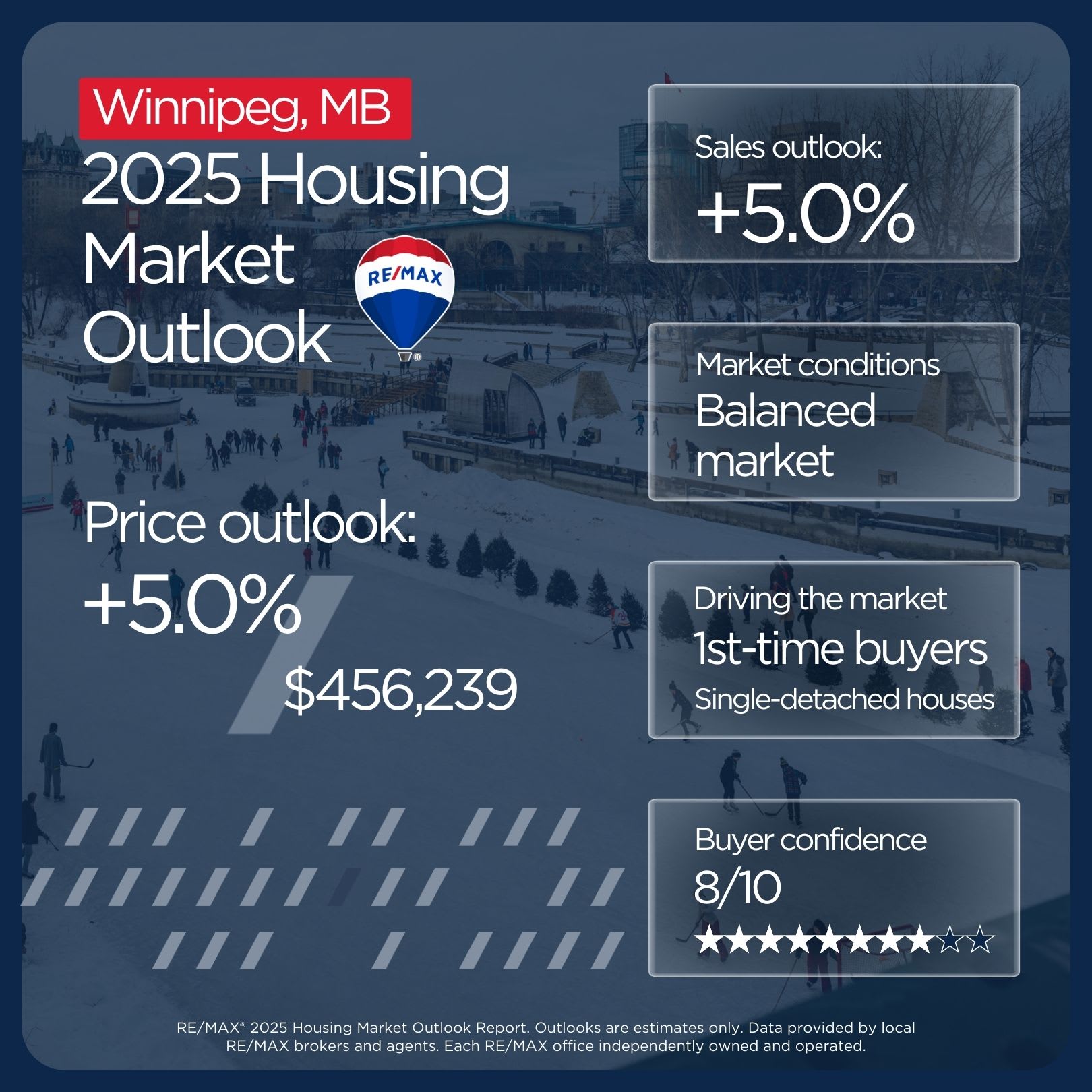
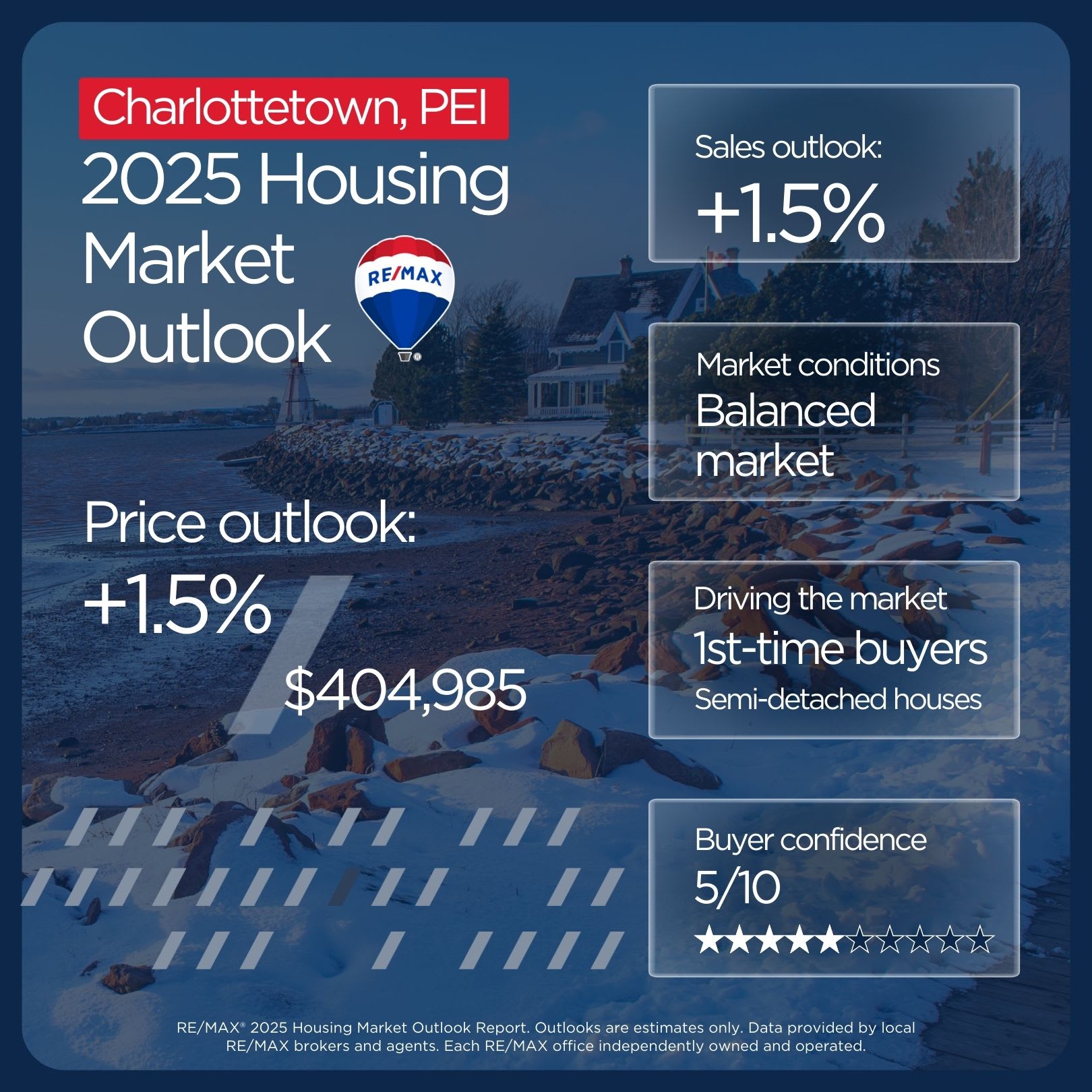
RE/MAX examined condominium activity between January – August 2024 in seven major markets across the country including Greater Vancouver, Fraser Valley, City of Calgary, Edmonton, Greater Toronto, Ottawa and Halifax Regional Municipality, and found that condo listings have soared in anticipation of increased demand in the fourth quarter of 2024 and early 2025.
Condo Market Trends
- Condo sellers have returned to the market, as the promise of further interest rate cuts attracts buyers and heightens demand in late 2024 and early 2025. As a result, condo listings have soared.
- This is arguably the most favourable climate condominiums buyers have seen in recent years, with less competition from investors and a good supply of inventory.
- Condo values have held up surprisingly well given the influx of listings, with price gains reported in 86% of markets examined.
- Immigration and inter-provincial moves will drive demand for condos in 2025, which are a typical entry level home seen as a first step to home ownership, and a middle step tin Canada’s priciest markets.
Regional Market Trends
RE/MAX brokers and agents in Canada’s biggest cities were asked to provide an overview of condo market activity in 2024, and an outlook for the remainder of the year and into 2025.
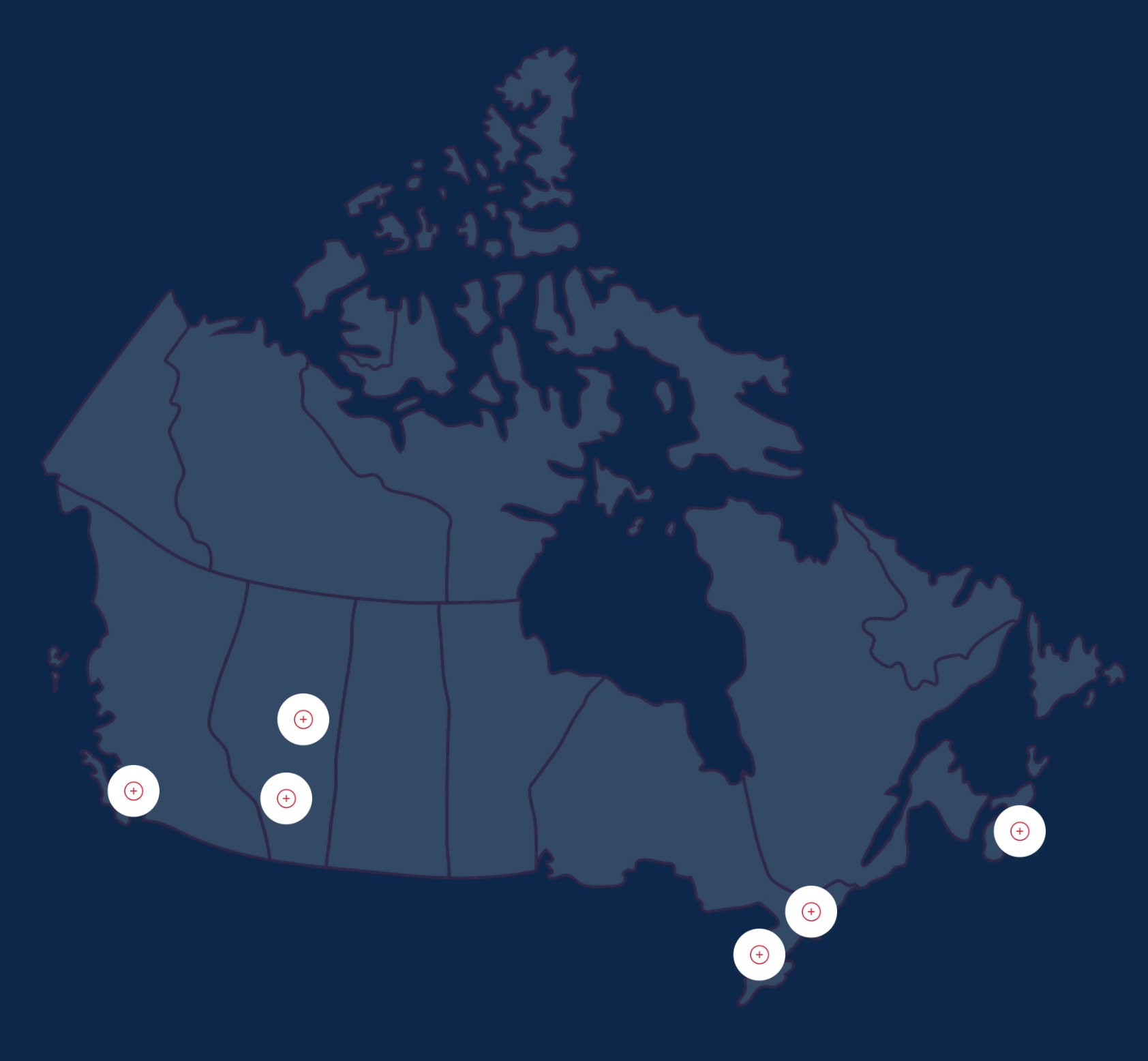
Social Shareables
There are regional and national assets available for you to download and leverage on your social channels to help keep your clients and network informed on the latest condo market trends.




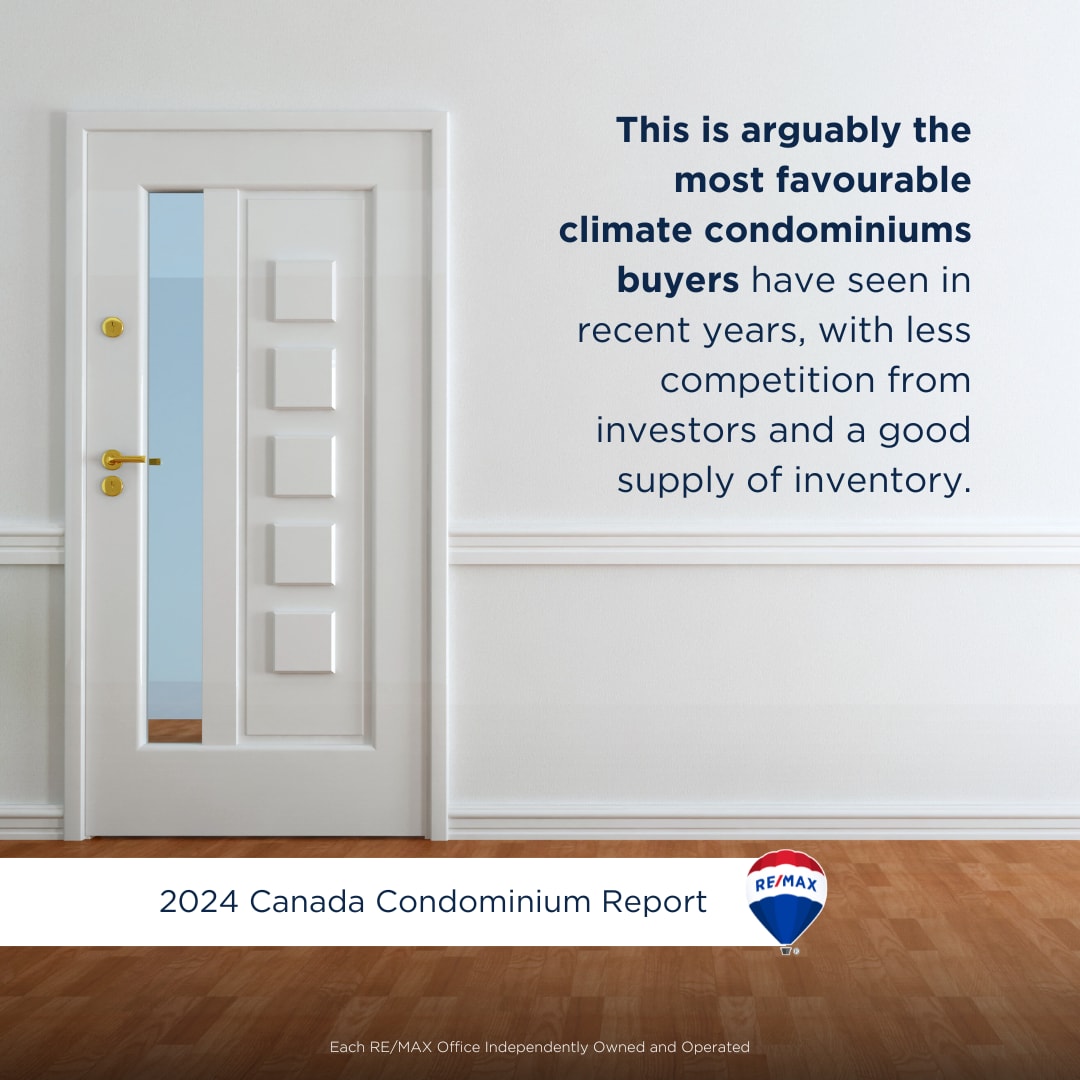
Billions spent in infill and renovation over the pandemic years have changed the housing landscape in Toronto and Vancouver, raising the overall value of residential housing stock and supporting higher prices on single-family homes in the future, despite downward market pressure.
Trends at a Glance
- Revitalization is one of the most underestimated factors behind the downturn of housing affordability and availability in Toronto and Vancouver. With undeveloped land committed to high-density, the single-detached home is quickly becoming a unicorn.
- Between 2019 and 2023, the increase in renovation spending approached $300 billion nationally, up 8% over the previous five-year period, yet the value of residential building permits issued for single-family dwellings fell in the Toronto and Vancouver during the same period, due to a greater focus on high-density construction.
- Close to 30% of the GTA’s existing housing stock and an estimated 20% of Vancouver’s was constructed in 1960 or before. The push to make the best use of scarce land has homeowners and builders aiming to maximize square footage or increase density on individual building lots in traditional urban neighbourhoods.
- Robust renovation and infill activity and the resulting lift in detached values has inevitably impacted the urban housing ladder. We’ve heard about the disappearing or ‘missing middle.’ Due to rising detached values, the middle is now more likely to be a link home, a townhouse, or a condo unit.
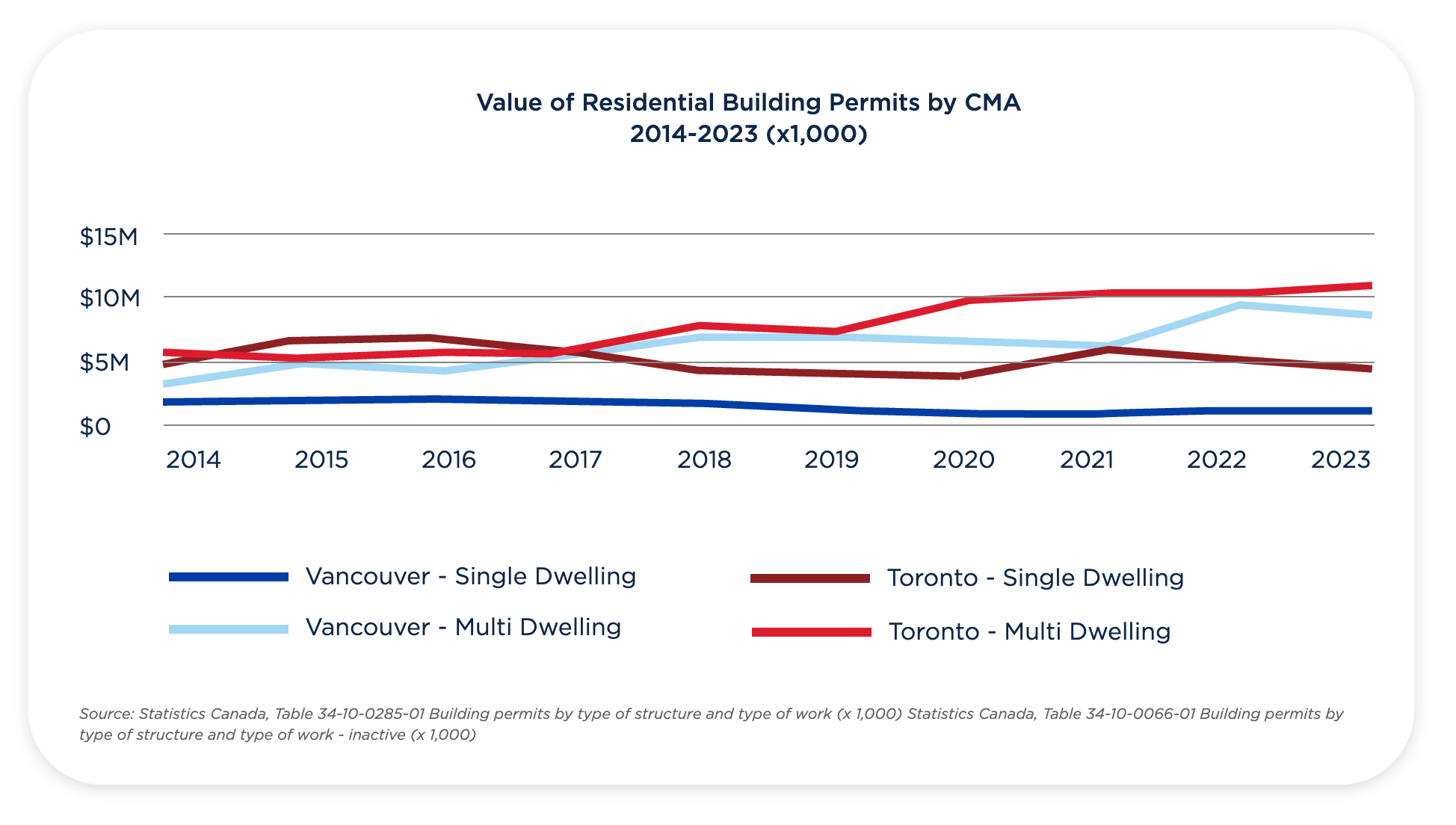
Regional Highlights
RE/MAX brokers and agents offer local insights on the changing housing landscape.
Vancouver:
- Renovation, rehabilitation and infill continue unabated in Vancouver proper, with new buyers and existing homeowners embarking on renovation projects and builders looking to increase densification.
- Red tape and restrictions are making it difficult to subdivide larger lots, given current zoning in many neighbourhoods.
- Vancouver is rapidly changing and existing detached homes are seeing upward pressure on pricing, particularly when renovated to today’s standards.
- Interestingly, the City of Vancouver is seeking to retain character homes, typically those built before 1940 that represent the original aesthetic of core neighbourhoods.
- Maximizing square footage and density on existing lots will continue to be a growing trend.
Toronto:
- A significant influx of young buyers is moving into communities and homes once inhabited by parents and grandparents.
- Instead of selling their homes, newcomers kept their properties and moved north, east and west of the city where houses and lot sizes were bigger and more conducive to large families, while renting out their existing homes.
- This trend is also visible in areas such as East York, Riverdale and Leslieville, particularly where there are strips of semi-detached, townhomes and row housing.
- The evolution of housing stock in these communities, which began in the 1980s, is almost ready for a second revival.
- Renovation and infill activity is raising the average price of homes one property at a time, impacting values of surrounding real estate, changing the physical landscape as well as the mix of the housing supply and homebuyers in the city.

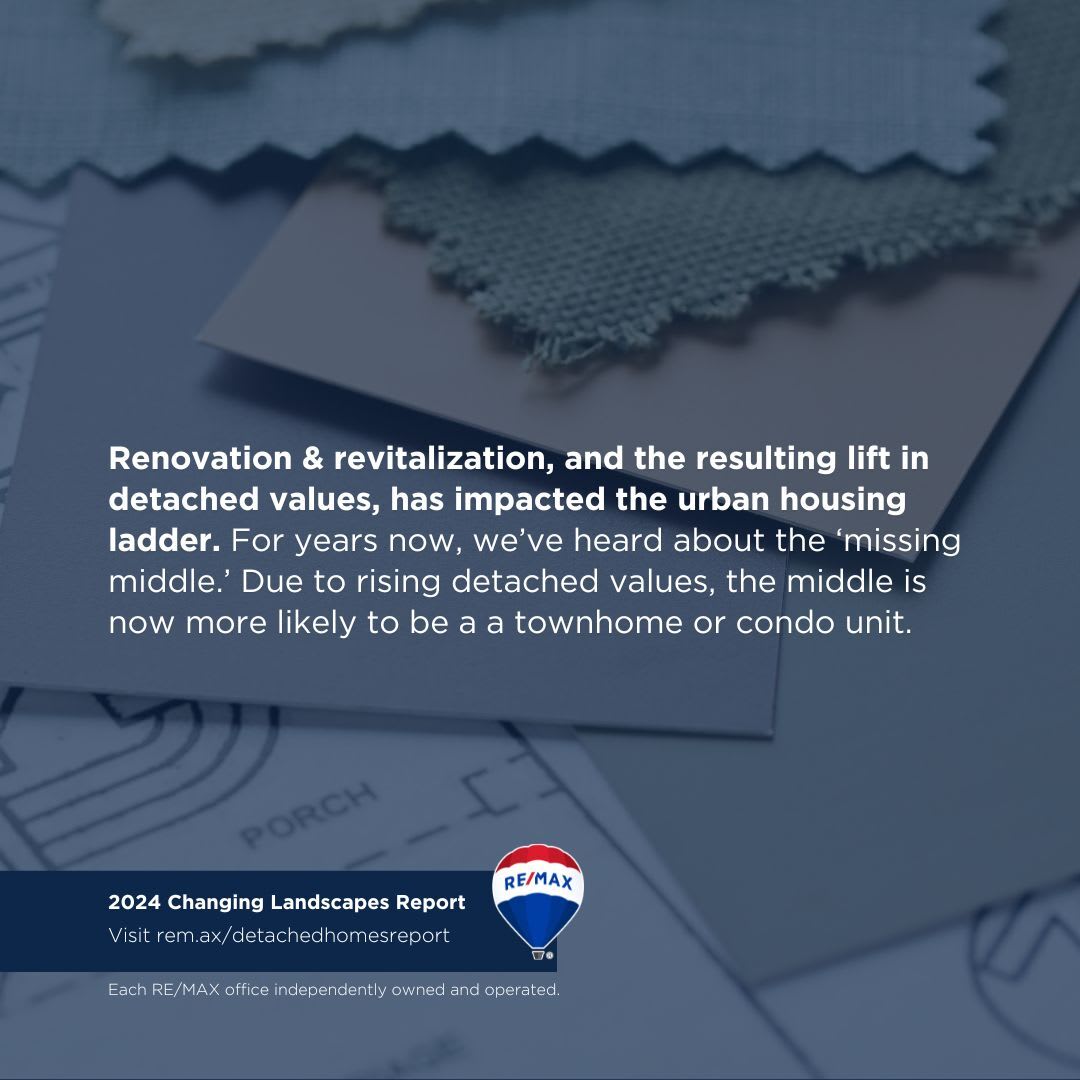

According to the RE/MAX 2024 Fall Housing Market Outlook Report, the long-anticipated decline in interest rates is expected to have a ripple effect on the market this fall, with consumer confidence rising and average sale price increasing in most regions by year’s end.
Trends Going Into the Fall Market
- 2024 Price Outlook: National residential sale price expected to increase in 76% of regions this fall.
- 2024 Sales Outlook: One-third of housing markets analyzed are expected to be seller’s markets this fall.
Regional Highlights
RE/MAX brokers and agents share insights on their local markets and estimated outlooks for fall 2024. Read the full report on remax.ca to stay informed.

Share the Report on Social
Download and use these national and regional assets (tiles, animation, and reel) in your marketing campaigns, socials, or simply share the report directly from the RE/MAX Canada channels on Facebook, Instagram and LinkedIn.



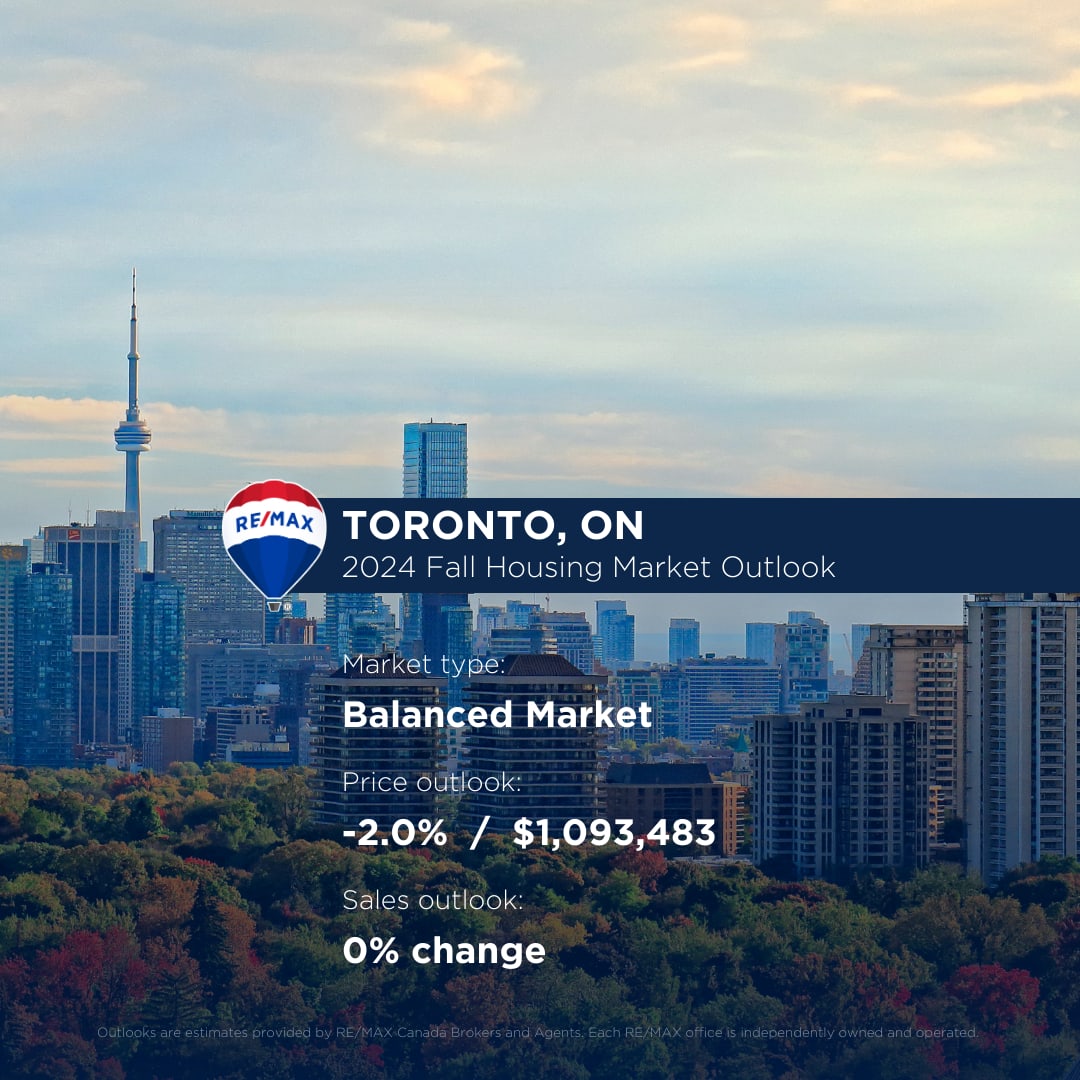

The 2024 Hot Pocket Communities Report explores detached home trends in the Greater Toronto, Greater Vancouver and Fraser Valley markets. This report explores how experienced buyers & investors are creating a bump in key detached housing markets resulting in detached home values to climb in over 80% of Fraser Valley communities; 70% of Greater Vancouver; and 40% of the GTA’s 905 areas.
Market by Market Overview
Download, view and share the heat maps which identify price differences YoY for detached properties across all neighbourhoods within the GTA and GVA.

Trend-spotting
Share these insights below with your clients via social, add to your next newsletter or publish findings from the report and trends you are seeing to your website.
Share the Report on Social
Download and use these assets (7 static images and a reel) in your marketing campaigns or socials or simply share the report directly from the RE/MAX Canada channels on Facebook, Instagram and LinkedIn.



The 2024 RE/MAX Liveability Report explores the neighbourhood qualities that resonate most with Canadians, and determined the best neighbourhoods according to those criteria, nationally and across 23 cities. Cities in Prairie provinces, such as Alberta and Manitoba, overwhelmingly top the list, with some of the most liveable neighbourhoods in Canada.
Liveability Trends
- Affordability (44%): Most Canadians named affordability as the #1 most-important liveability factor in 2024, although it’s notable that this factor declined in importance by 3% compared to a 2020 survey.
- Neighbourhood Safety (10%): New on the top list in 2024, neighbourhood safety took the #2 spot of most-important factors to consider when choosing a place to live.
- Walkability (6%): The walkability of a neighbourhood ranked as the third ranked most-important liveability factor among Canadians in 2024.
- Age of Home (6%): A new criterion added to the liveability ranking in 2024, the age of homes in a neighbourhood tied for third place with walkability. 6% of Canadians consider it the most important factor when it comes to their perceived liveability of an area.
Most Liveable Neighbourhoods
RE/MAX brokers and agents share insights on their local markets, most-affordable neighbourhoods and what’s up-and-coming.
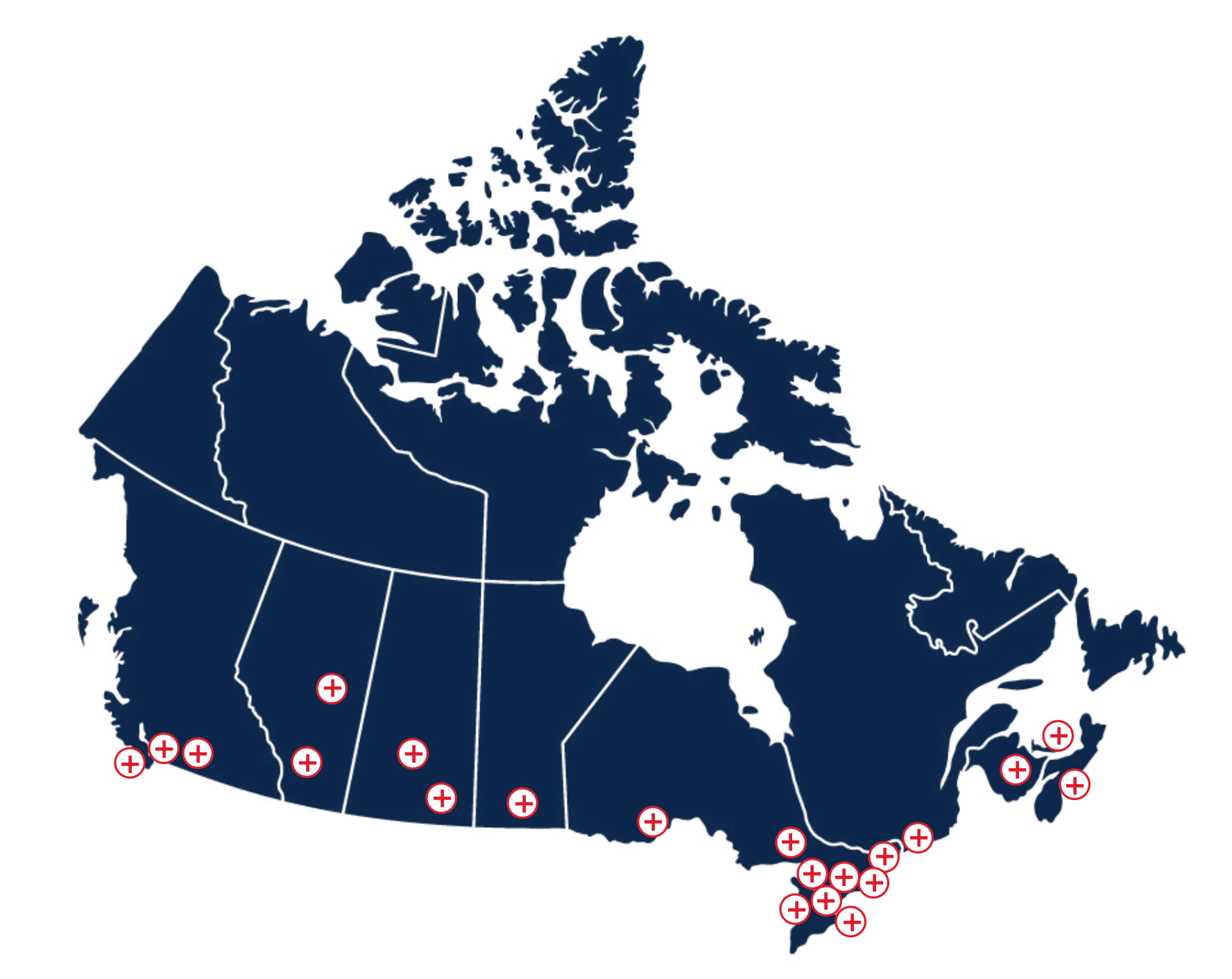
Lifestyle & Liveability
As part of the report, RE/MAX also ranked a list of neighbourhoods in Canada that are best suited to specific lifestyle personas, including: best downtown lifestyle with kids, best downtown lifestyle with no kids, best for first-time homebuyers, best for retirees, best for luxury seekers, and more.
According to the 2024 RE/MAX Commercial Real Estate Report, strong population growth and housing supply issues have prompted a significant shift in the Canadian commercial real estate market as builders and developers adopt an “all-hands-on deck” approach to solving Canada’s housing shortage.
Commercial Market Trends
- Multi-family construction continues unabated across Canada.
- High-density and mixed-use development is on the rise.
- Capital gains tax — the government giveth and taketh away.
- Industrial real estate continues to experience strong demand.
- Bricks and mortar retail stores still hold their appeal.
Market-By-Market Analysis
View the interactive report on remax.ca and click the icons to discover the regional commercial market trends.
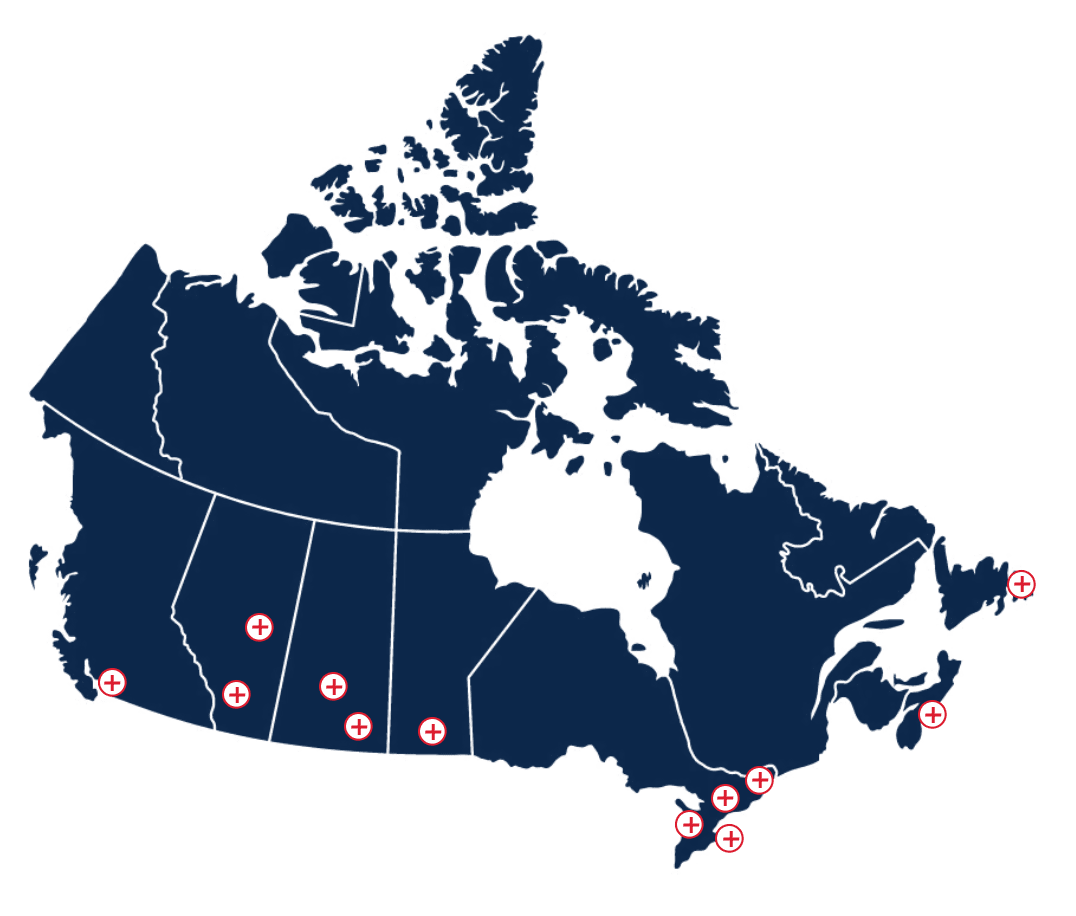
Ontario Atlantic Canada
Share the Report on Social
Help keep your network informed on the latest commercial real estate market trends by leveraging the report on your social channels. Start by downloading and posting the national social assets to your channels or by directly sharing the report on Facebook, Instagram, and LinkedIn.


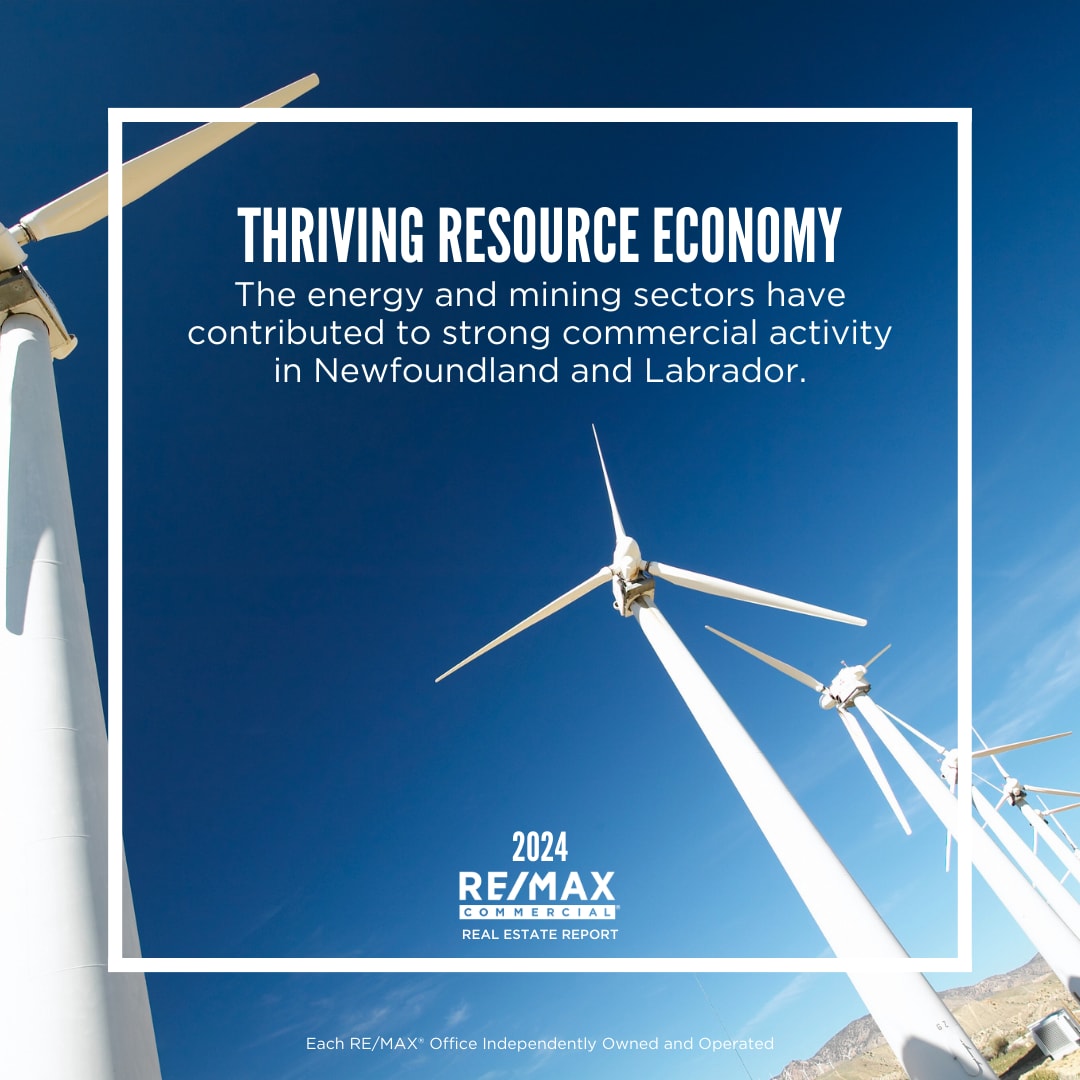
According to the RE/MAX Canada 2024 Cottage Trends Report, despite the affordability challenges and higher interest rates that characterized the 2023 real estate market, Canada’s cottage owners are choosing to hold on to their properties in 2024 rather than selling off – a trend that’s likely influenced by the desirable quality of life alongside the prospect of future returns on recreational property ownership.
Report Trends
- Recreational property prices expected to rise 6.8% in 2024.
- 64 per cent of Canadian cottage owners have decided not to sell this year.
- When it comes to a recreational property purchase, half of Canadians prioritize affordability (46 per cent, up from 43 per cent in 2023), followed by proximity to water (35 per cent), and necessary amenities (27 per cent).
Regional Market Insights
Overarching regional trends pinpointed by the RE/MAX network include: Families and couples are the primary drivers of activity in the recreational property market – 82% and 68% respectively, and 54.5% of regions in Western and Atlantic Canada have experienced increased inter-provincial migration activity, while Ontario witnessed increased intra-provincial migration activity.

Share the Report Findings
Help keep your clients and network informed on the latest Canadian recreational market trends by leveraging the report findings on your social channels. Start by downloading and posting the regional and national social assets to your channels or by directly sharing the report on Facebook, Instagram and LinkedIn.
With the end of quantitative tightening in sight, luxury home-buying activity in most markets across the country are slowly shifting into high gear as buyers reap the benefits of softer housing values.
The 2024 RE/MAX Canada Spotlight on Luxury Report examined luxury home-buying activity in 10 markets across the country in the first two months of the year and found that, despite a disconnect between buyers looking for deals and sellers’ price expectations, almost all regions reported a strong start to the year.
Key Findings
- Condo Sales: Condominium sales are up almost 70% in Greater Vancouver. 27 strata condo sales averaging $4 million were recorded between January 1 and February 29 of this year. In contrast, there were 16 sales during the same period in 2023, with an average price of $4.5 million.
- Multiple Offers: Multiple offers occurring in Calgary; some homes selling sight unseen. Some multiple offers are occurring in Saskatoon, although at the lower price points. This may filter upward in coming months.
- Sales Growth: Double-digit sales growth was seen in 7/10 markets. These include Saskatoon (57%), Montreal (+55.6%), Calgary (+52%), Edmonton (+32%), Winnipeg (+19.4%), Halifax (+16.7%) and Toronto (+14.4%).
- Affordable Luxury: Alberta markets remain strong. Calgary and Edmonton have been bolstered by affordability.
- Uber Luxury: The uber-luxe market heats up in Toronto, cools in Vancouver. The Greater Toronto Area experienced a 77% jump in sales over $5 million, split fairly evenly between the 416 and 905 regions. On the west coast, demand for uber-luxe properties has fallen year-over-year, largely attributed to the Foreign Buyer Ban.
- Inventory: Inventory in Toronto is tight in many hot-pocket areas. However, values are being held in check for the most part, for now.
Regional Insights
View the interactive map on remax.ca to discover your local luxury market insights.
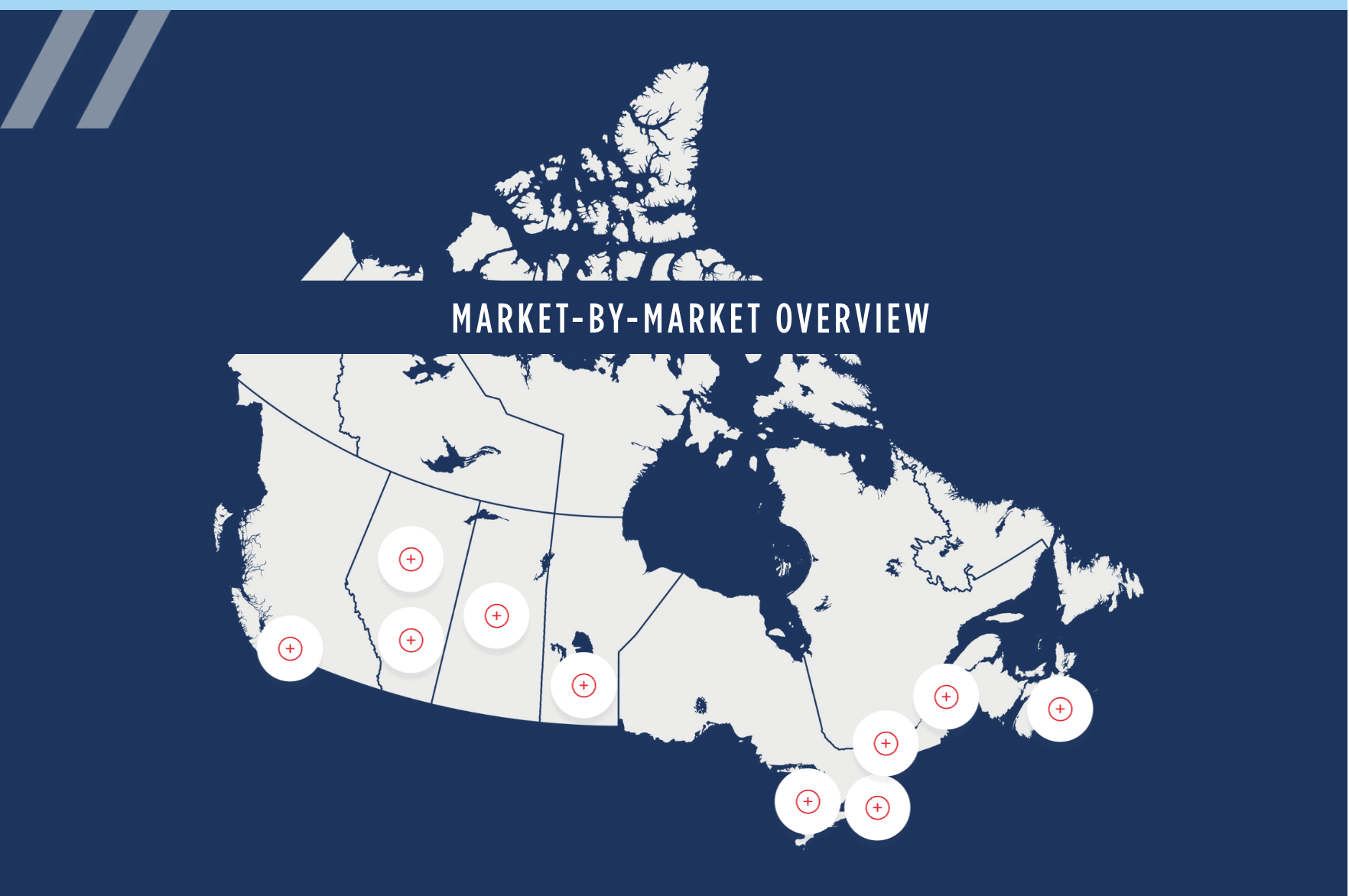
Share the Report Findings
Download and share the national graphics and regional graphics on your social channels to help keep your clients informed on the luxury market in Canada.



Necessity is the mother of invention. Economic conditions are compelling young Canadians to explore alternative ways to achieve their dream of home ownership, according to the RE/MAX 2024 Alternative Home Ownership Models Report.
Report Highlights
- 32% of Canadians are currently exploring non-traditional ways to enter the housing market.
- 47% of Canadians would consider non-traditional forms of home ownership in the future.
- Among those using alternative home ownership models, the most popular are: Rent-to-own program (22%), Co-ownership with family that isn’t a spouse or partner (21%), rental property (17%).
- 73% of Canadians believe home ownership is the best investment they can make in 2024.
Regional Market Insights
According to the RE/MAX network, 71 per cent of regions surveyed noted a slight uptick in non-traditional home-ownership situations.
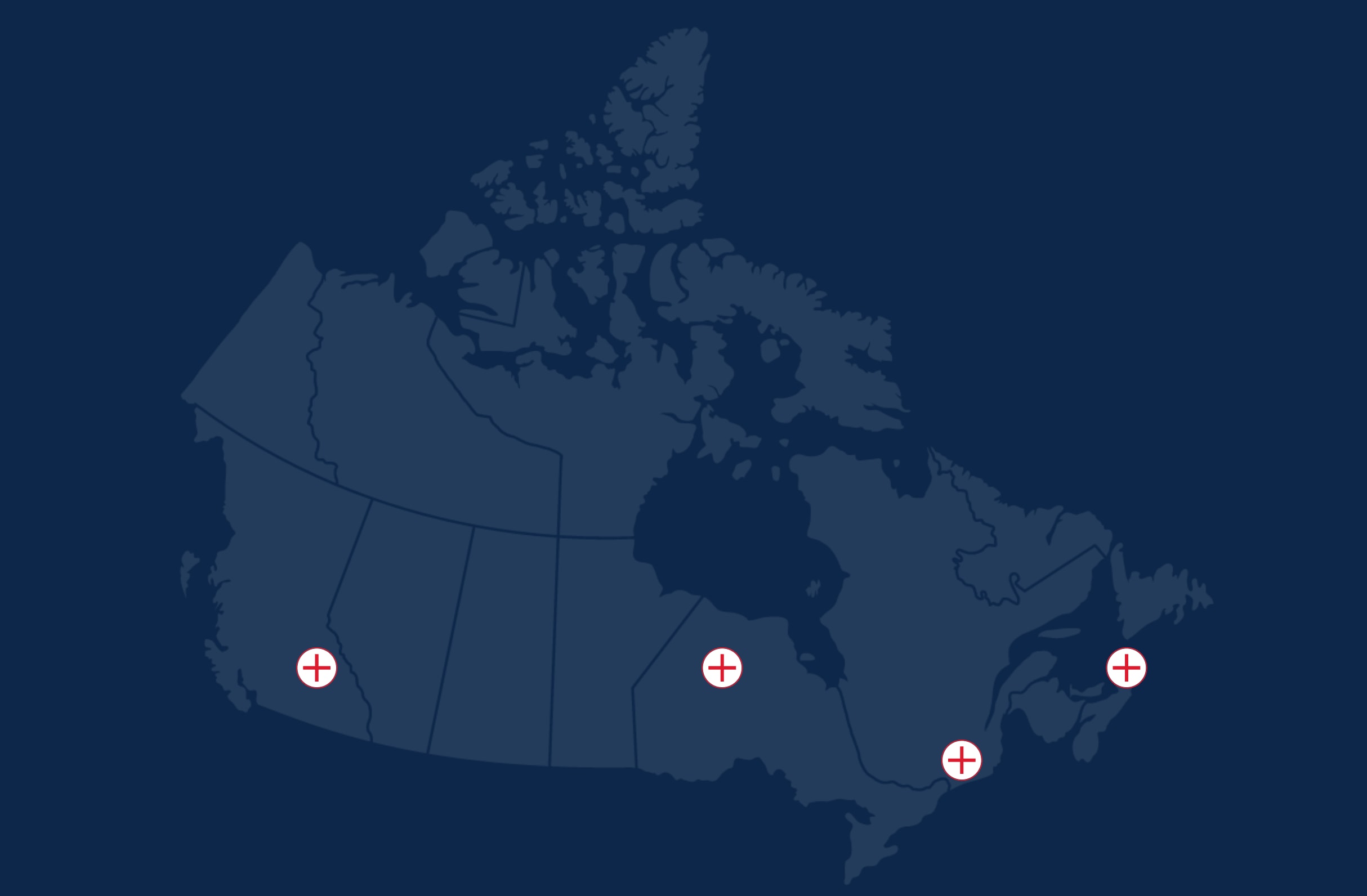
Share the Report on Your Social Channels
There are various reels and a social graphic available for you to download and share on your social channels to help keep your clients and network informed on the latest RE/MAX report.


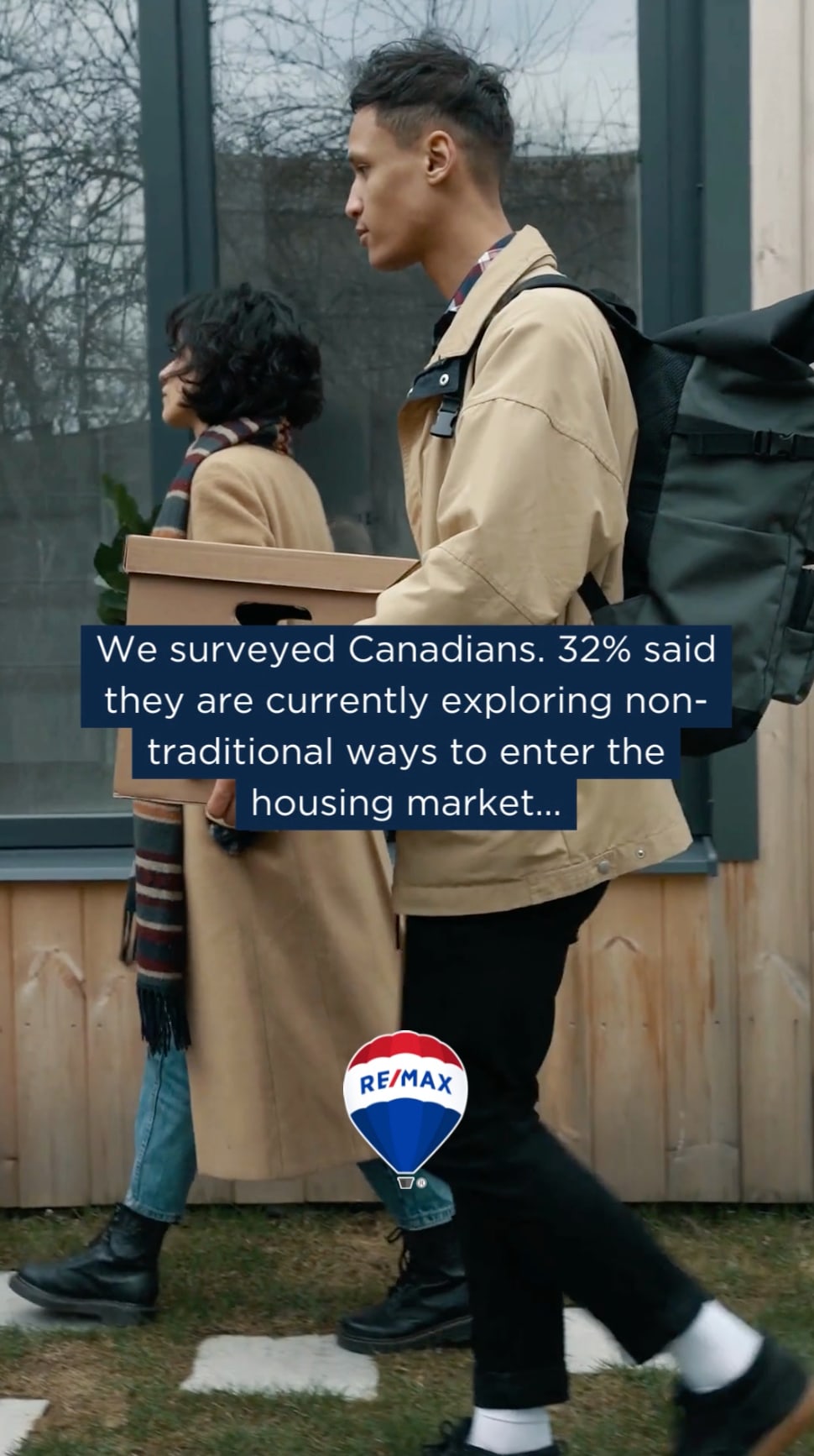
While land transfer taxes and new property assessments in key markets appear to have little effect on the surface, eroding affordability levels are slowly shifting migration patterns and changing the landscape in major Canadian centres, according to the RE/MAX 2024 Taxes & Canadian Real Estate Report.
Report Highlights
- Tax rate increases, in tandem with record-high housing values and mortgage rates, have sparked a post-pandemic exodus from the country’s most expensive markets, contributing to a significant uptick in interprovincial migration numbers in Alberta and Atlantic Canada in 2023.
- The average Canadian family pays 45.3% of its income to taxes. That’s more than the 35.6% spent on necessities of life.
- 28% of Canadians agree that the land transfer tax has impacted their decision to participate in the housing market.
Regional Insights
- Greater Vancouver Area: The tax burden weighs most heavily on buyers in markets such as the Greater Vancouver Area where housing values are amongst the highest in the country. Yet first time, move up, and downsizing buyers remain determined to move forward, regardless of tax implications.
- Calgary: Home-buying activity continues at a frenzied pace in the Calgary area as affordable housing values and lower tax rates incentivize an increasing number of out-of-province buyers to move to Alberta.
- Winnipeg: A significant uptick in housing sales and values in the last six weeks of 2023 has set the stage for home-buying activity in Winnipeg in 2024.
- Greater Toronto Area: After a flurry of home-buying activity at luxury price points in the final quarter of 2023 in Toronto Proper due to upcoming changes to the city’s 2024 land transfer taxes, the housing market has slowed in the Greater Toronto Area.
- Montreal: While higher interest rates and the threat of a recession seriously hampered home-buying activity in Montreal over the past year, housing taxes – in the form of a welcome tax and property tax – proved to be a negligible part of the equation in 2023.
- Halifax: With housing market uncertainty seeping into January 2024, homebuyers in Halifax are banking of the prospect of lower interest rates down the road to revitalize home-buying activity.
Share the Report on Social
Help keep your clients and network informed on the current Canadian market landscape by leveraging the report on your social channels. Start by downloading and posting the regional graphic and reels to your channels or by directly sharing the RE/MAX Canada posts on Facebook, Instagram or LinkedIn.

Canadians’ outlook on home ownership remains positive, according to the RE/MAX 2024 Housing Market Outlook Report, despite challenging market conditions in 2023, including a persistent housing shortage, and a tricky interest rate environment. According to the report, the majority of Canadians (73 per cent) are confident that home ownership is the best investment, a sentiment that remains unchanged year-over-year.
National Market Outlook
- 2024 Price Outlook: The national average residential price is expected to rise slightly in 2024, by 0.5%.
- 2024 Sales Outlook: 59% of Canadians housing markets surveyed are anticipating unit sales to increase in 2024.
- 2024 Market Type: 41% are expected to regain balance; 28% to favour sellers; 21% to favour buyers; and 4% to experience mixed conditions.
Consumer Insights
According to a Leger survey commissioned by RE/MAX Canada as part of the report, the majority of Canadians (72 per cent) believe that as municipal, provincial and federal governments make plans to increase housing supply, it’s important that they consider the diversity of the new housing that’s developed. Explore the interactive report on remax.ca to learn more and share the national social graphics and reels to help keep your network informed on market trends.


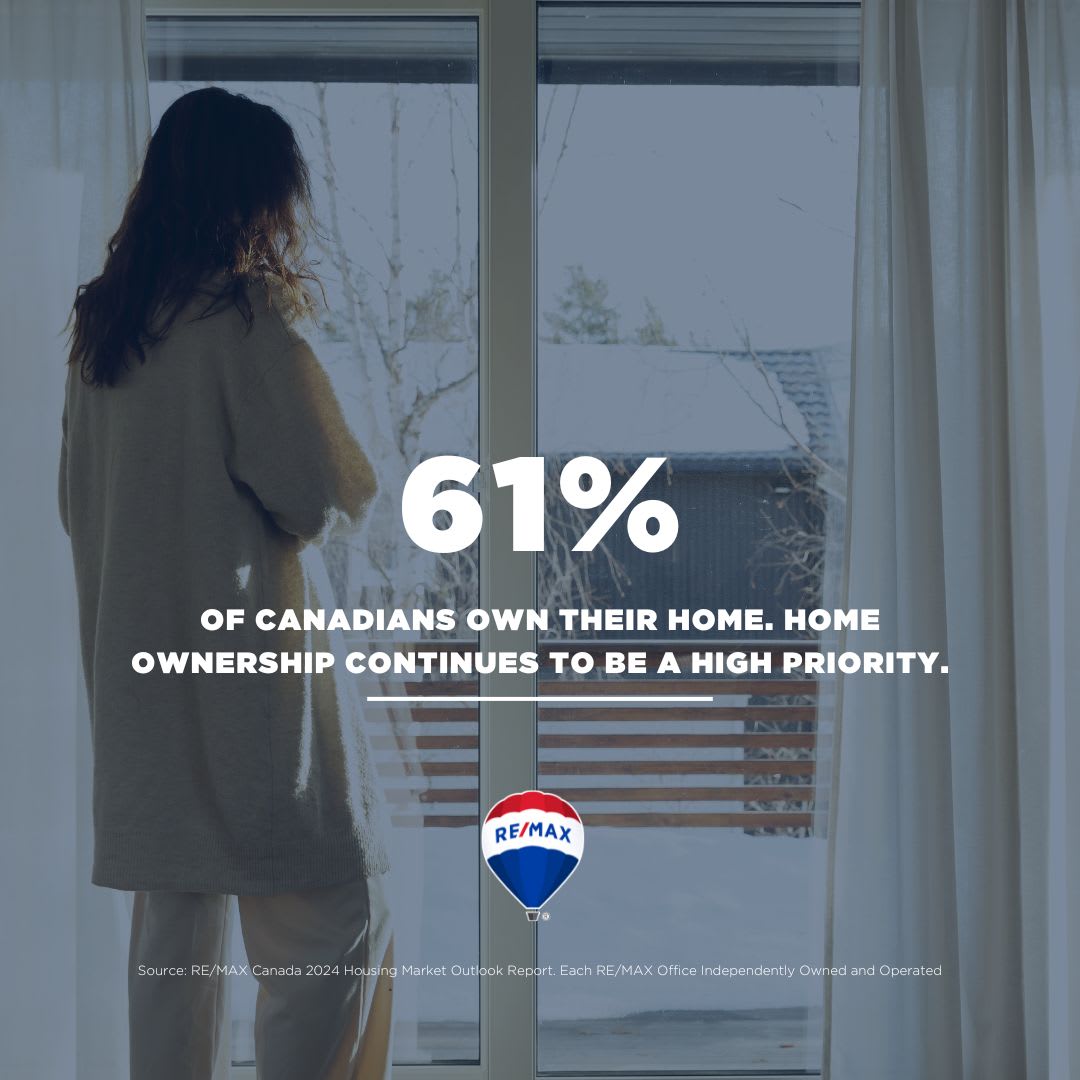
Regional Highlights
Based on a year-over-year regional analysis by RE/MAX brokers and agents between Jan. 1 and Oct. 31, the majority of regions surveyed noted many homebuyers are looking for primary residential properties with rental potential, to get the most out of their investment and offset the rising cost of living and reduce mortgage payments. This is likely to be a leading influential factor in 2024. Gain insights on what to expect in your housing market by viewing the interactive report on remax.ca and clicking your region’s tile.
